Originally posted on Fairview Lending
Home values slipped for the second consecutive month as mortgage costs continue to sideline buyers. From June through August, prices usually decline about 2%, but this year they have fallen about 6%. At the same time, mortgage rates hit highs of around 6.4%. What does this mean for prices the rest of this year and into next year? When will a rebound occur?
What was in the recent National Association of Realtors data?
Sales of previously owned homes fell 0.4% in August from July to a seasonally adjusted annualized rate of 4.80 million units, according to the National Association of Realtors. That is the slowest sales pace since May 2020, when activity stalled very briefly due to the start of the Covid pandemic.
Outside of that, it is the slowest pace since November 2015. Sales were 19.9% lower than in August 2021. From June through August, prices usually decline about 2%, but this year they have fallen about 6%.
“The housing market is showing an immediate impact from the changes in monetary policy,” said Lawrence Yun, chief economist for the Realtors, noting that he will revise his annual sales forecast down further due to higher mortgage rates. “Some markets may be seeing price declines.”
Long and short, the rapid hiking of rates by the federal reserve is having the intended consequences of slowing down the housing sector and one of the leading drivers of inflation (rent growth).
Housing price declines are indicative of more pain in the economy
Robert Shiller who became famous for predicting the last crash published an economic research report to explain how housing prices impact general spending. Here are the findings:
“The results presented here with the extended data now show that declines in house prices stimulate large and significant decreases in household spending.
The results presented here with the extended data now show that declines in house prices stimulate large and significant decreases in household spending. The elasticities implied by this work are large. An increase in real housing wealth comparable to the rise between 2001 and 2005 would, over the four years, push up household spending by a total of about 4.3%. A decrease in real housing wealth comparable to the crash which took place between 2005 and 2009 would lead to a drop of about 3.5%”
“Our statistical results suggested that there were significant “wealth effects” upon consumption associated with both types of wealth, housing wealth and financial wealth, but that the stimulatory effects of housing wealth substantially exceeded the effects of financial wealth.”
As house prices decline, spending declines substantially as owners feel less “wealthy”. This explains why consumer spending has held up so much recently even after a major stock market correction.
Where will real estate prices head in 2022?
The first half of 2022 started out excellent with prices mid year up around 14%, this trend reversed in the summer and will likely accelerate in the fall leading to prices about flat in most markets. Unfortunately in order to get to a flat market, there will need to be an adjustment in the 10-14% range off the highs reached in May.
Even though prices are falling, interest rates are rising substantially faster jumping over 200% in the last 6 months or so from 2.75% to around 6.4% at the time I wrote this article.
The Silver lining in declining housing prices
The Shiller paper shows that as prices continue to drop due to federal reserve tightening leading to increased mortgage rates should substantially slow spending. This slow down in spending will be welcome news to the federal reserve as this is a requirement to ultimately get inflation closer to their target. The one issue is that there is a lagged effect to see the decline in spending. It could happen 12-24 months from the beginning of the tightening cycle.
What happens to real estate prices in 2023?
Fannie Mae, the largest buyer of residential mortgages, just came out with their new predictions:
Doug Duncan, Fannie Mae Senior Vice President and Chief Economist. “Inflation’s entrenchment – and the policy action likely required of the Fed – confirms the expectation in our forecast of a moderate recession beginning in the first quarter of 2023. That said, the rise in rates is having the Fed’s desired effect on housing, as house price growth began to slow in June. We expect the slowdown in housing to continue through 2023 as affordability constraints mount for potential homebuyers, and considering, too, that refinance activity has been significantly curtailed by the rise in mortgage rates.”
Look for mortgage rates to remain high through 2023 which will further crimp housing demand.
Summary
The markets are beginning to price in a small recession early next year which will continue to put pressure on real estate as the federal reserve will not be able to immediately adjust interest rates due to the nagging inflation. Unfortunately, I don’t see much good news in 2023 on the real estate front as rates remain high. 2023 will show substantial declines in most real estate markets in the 10-15% range. Assuming Fannie is correct, 2024 looks to be better as rates decline and inflation finally settles back into more traditional patterns.
